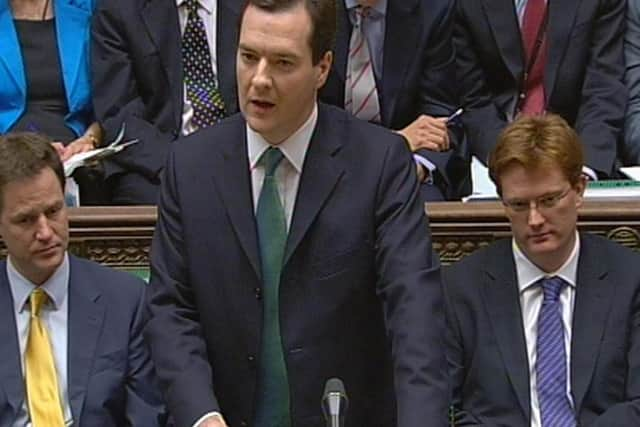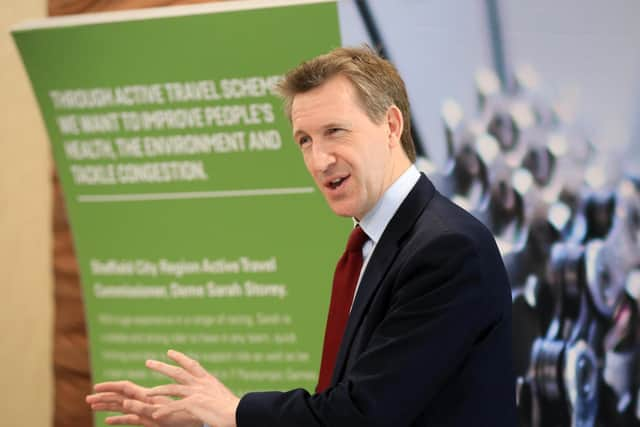Northern England hit hardest by decade of austerity, report by think tank IPPR North reveals
All three northern regions have seen rises in the "hidden homeless" over the past decade, according to findings published yesterday by think tank IPPR North, with more than half of households in temporary accommodation last year including children.
It comes exactly ten years since then-Chancellor George Osborne's emergency Budget, in which he vowed to "protect the most vulnerable in our society".
Advertisement
Hide AdAdvertisement
Hide AdSheffield City Region Mayor Dan Jarvis has now written to current Chancellor Rishi Sunak, demanding concrete plans to be set out for "levelling up" the economy.


Council spending has fallen by £315 per person in Yorkshire & the Humber compared to the £279 average drop across England, according to yesterday's report.
Meanwhile, all three northern regions have seen rises in the "hidden homeless" with 5,165 households in temporary accommodation in the North last year. More than half of these included children.
The number of children living in temporary accommodation in the North has risen from 1,840 to 5,635 over the past decade.
Advertisement
Hide AdAdvertisement
Hide AdChildren with special educational needs in the North have also been adversely affected, with spending on them cut by a third over the past six years.


Spending per pupil through the 'High Needs Block' is now £17,003 per pupil, compared to £25,409 in 2013/14. In comparison, across England the fall was 29 per cent and is now at £17,737.
On June 22, 2010, Mr Osborne stressed in his Budget speech that "we are all in this together".
However, IPPR North's report yesterday also revealed that median weekly pay in northern England has grown by less than two per cent since 2009, while public sector employment in the region fell by 19 per cent as many such jobs have risen in central government.
Advertisement
Hide AdAdvertisement
Hide AdWorkers in Yorkshire and the Humber on average earn £38 less per week than the average earners in England, IPPR North research claims.


Mayor Mr Jarvis is calling for a shift in power away from Westminster, and wrote to Mr Sunak to say billions of investment would be needed to soften the economic blow from the Covid-19 pandemic.
Mr Jarvis said: “The North has suffered badly from Covid. But even before the pandemic, our potential was being squandered. This neglect has been an act of national self-harm that has hurt the whole country, not just us. It is past time to stop this waste.
"We urgently need a massive stimulus to create jobs and help people and businesses. But even these short-term actions must support much bigger goals. It is not enough to return to a deeply flawed status quo: we need to build back better."
Advertisement
Hide AdAdvertisement
Hide AdIn February, the UK2070 Commission recommended that the government should commit an extra £200bn over the next two decades to tackle inequality. Prior to this, research by Transport for the North claimed that re-balancing the books would see the Northern economy £97bn larger than it would have been by 2050.


Researchers at IPPR North are renewing calls for the government to "learn the lessons of austerity" and to focus its rhetoric on funding the areas most in need of investment.
Researcher Marcus Johns said the past decade of cuts had "undermined efforts to improve quality of life" in northern England and "eroded our resilience" to events like Covid-19 or the looming climate crisis.
He said: “We must the learn lessons of centrally imposed austerity. It has been a failure. We need real power and resources for the North and England’s regions, so that we can protect our public services and our people from being undermined by Westminster in future.
Advertisement
Hide AdAdvertisement
Hide Ad“More than the rhetoric of levelling up, we need a sustained programme of empowerment and investment in the towns, villages, cities, and people of our region to put right a decade of harm and lost opportunity for northern people, especially our most vulnerable.”
Local Government Minister Simon Clarke MP said councils were being given an “unprecedented” package of support, including £3.2 billion of emergency funding during the coronavirus pandemic – with the North receiving the “highest level of funding per-person compared to the rest of the country”.
“This is on top of a £2.9 billion increase in councils’ core spending power this year – the biggest annual real-terms increase in a decade", Mr Clarke said.
“In total, the Government has provided over £27 billion to support local councils, businesses and communities in fighting the pandemic, including £600 million to help reduce the infection rate in care homes and £300 million to support track and trace.
Advertisement
Hide AdAdvertisement
Hide Ad“We will continue to work closely with councils as they support their communities through this national emergency and we are working on a comprehensive plan to ensure councils’ financial sustainability over the coming year."